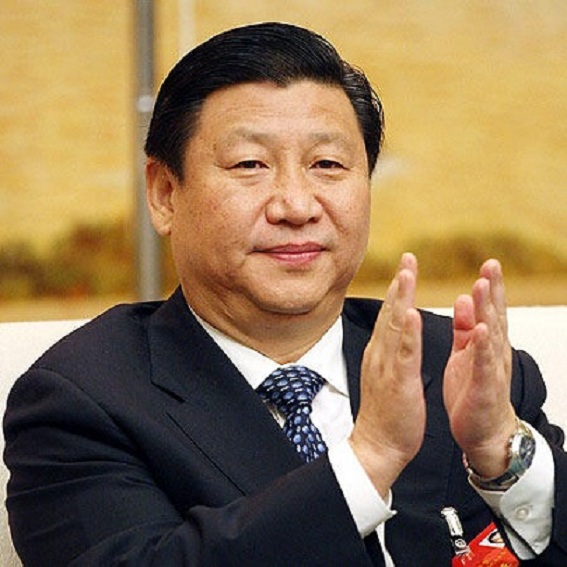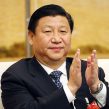
Appraising Xi Jinping’s Politicking
Publication: China Brief Volume: 13 Issue: 14
By:

At least since the politicking for China’s leadership succession heated up last summer, Chinese Communist Party (CCP) General Secretary Xi Jinping consistently has shaped the political environment in his favor, seemingly consolidating control much earlier than many expected. The official reporting of Xi berating his colleagues in a three-day Politburo session in late June combined with the announcement of a mass line campaign to draw the CCP closer to the people suggests he is turning up the pressure on his colleagues (People’s Daily, June 26; Xinhua, June 26). With the trip to Xibaipo in Mao Zedong’s footsteps following on last December’s “Southern Tour” in Deng Xiaoping’s, some suggest President Xi is appealing to all sides (South China Morning Post, July 12). More likely, however, Xi is cloaking his administration within CCP canon—just as Deng did during the controversial early years of reform—to expand his freedom of action and deny his domestic political opponents legitimacy.
Given his performance to date, Xi has demonstrated a unique ability to achieve his political objectives. He probably has changed the landscape of Chinese politics, systematically strengthening his position while weakening others. Certainly, Xi seems more capable than his predecessor of exercising power between the two extremes of rhetoric and disposing of individual political opponents (“The Soapbox and the Truncheon: Hu Jintao’s Amorphous Power,” China Brief, July 19, 2012). Some highlights of Xi’s elite maneuvering include the following:
· Ahead of the leadership transition last year, Xi successfully outmaneuvered the outgoing Hu Jintao, displacing him as chair of the Central Military Commission and denying his protégés spots on a reduced Politburo Standing Committee. Early forecasts suggested it would require a political strongman to reduce the size of the Standing Committee and that the factions would be relatively balanced (“Hu Jintao’s Sixth Generation Protégés Play Safe to Ensure Promotion,” China Brief, April 26, 2012). Just as Jiang Zemin expanded the leadership ranks in 1997 to dilute his opponents’ power, Xi restricted membership to concentrate his.
· Xi’s two foreign policy concepts, “New Type of Great Power Relations” and “New Type of International Relations,” have created more international space for China’s development (“Chinese Dreams: An Ideological Bulwark, Not a Framework for Sino-American Relations,” China Brief, June 7). Getting Washington to sign on to the former, at least rhetorically, was a coup, because it signaled tacit U.S. acceptance of Chinese foreign policy principles that had long eluded Chinese efforts.
· During Hu Jintao’s leadership, the independent power of the Political-Legal Commission and the internal security apparatus under Zhou Yongkang seemed to grow almost out of control. Xi, however, rapidly asserted himself and may have taken on a Zhou Enlai-like role at the center of the intelligence and security services (Ming Pao, January 30). Moreover, Zhou Yongkang may now be the ultimate target of corruption investigation that has claimed several of his allies who remained in government (South China Morning Post, July 3; Want China Times, March 21). Xi also may have been behind the publication of a series of articles critiquing Zhou Yongkang’s preserving stability (weihu wending, or weiwen) apparatus last summer and may have set the stage for putting the Political-Legal Commission under the CCP general secretary’s thumb (“Central Party School’s Critiques Suggest New Leadership Dynamics,” China Brief, June 20, 2012).
· Proposals exist for cutting 20–30 million CCP members—a move that could cut roughly 25 to 40 percent of the party roster. Although the proposed cuts to party rolls probably qualify as trimming deadweight, Xi’s emphasis on anti-corruption, clean living and moral governing suggest any campaign to cut membership endangers any of the cadre who engaged in the system’s natural corruption (Global Times, May 30).
Rather than interpreting Xi’s invocation of the mass line as a return to Maoist tactics, another possibility worth entertaining is that he is adopting another traditional tactic: turning to the people during leadership contests. John Wilson Lewis opened his book on Chinese leadership noting, “The basic leadership theory and operational procedures of the Chinese Communist Party are the principal parts of these dynamics, which at first sight appear to be simply systems of command, but in fact are designed to produce affirmative responses by the Chinese people and cadres to the goals of Chinese communist policy.” The crux of Maoism (and this emerging Xi-ism) is to build popular support to provide a push for Chinese officials, catching them between the people and the party center. This may not quite be Qiao Shi calling for democracy in 1997 or Zhao Ziyang in 1989; however, it does position Xi squarely within the CCP’s traditions of controlled forms of democracy and the surviving legitimacy of Mao.
In the past, such political turns have signified an ongoing leadership challenge—a possibility that should not be overlooked, despite Xi’s seeming success. Xi’s policies and objectives potentially change the rules for mid-level cadres and challenge some vested interests. Most officials have survived at least a few self-criticisms and rectification campaigns, so party discipline alone will not achieve Xi’s objectives to reshape the party or push cadre to enforce his edicts (Guangming Daily, June 19). The mass line approach does offer an additional avenue through which to push a policy agenda; however, it is unlikely to be sufficient without additional supervisory provisions or changes to cadre promotion standards.
Given how centralized Xi’s power appears, it may be more accurate to say that Xi—rather than trying to please everyone—is trying to seal off the avenues by which he can be attacked. The mass line protects against the leftists, such as those who supported the ousted Bo Xilai’s “Chongqing Model.” Xi also has put substantial effort into meeting with the People’s Liberation Army, which traditionally has been an important base of support (“Commander-in-Chief Xi Jinping Raises the Bar on PLA ‘Combat Readiness’,” China Brief, January 18). If Xi’s politicking has been as strong as it appears from the outside, then the biggest questions involve the next steps. What will a secure Xi do with his power? Will he succeed where others failed on economic reforms?





